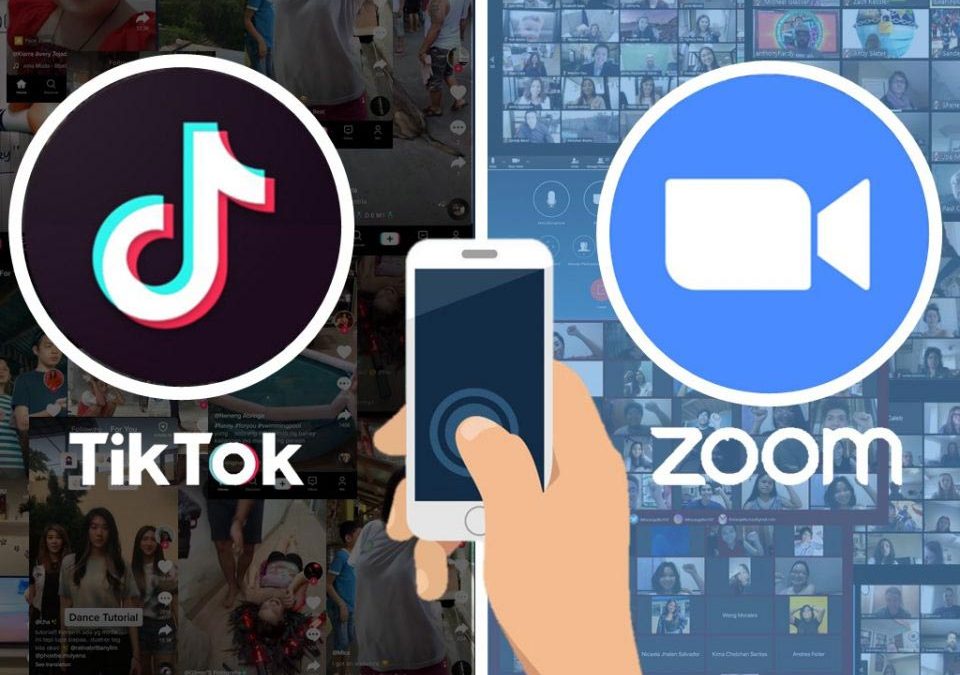
AN ECONOMY FOR THE PEOPLE: PH In The New Normal
July 2, 2020
Dive by the SEA
July 2, 2020Are Zoom and Tiktok safe?

There is no doubt that the Coronavirus outbreak has led to major changes across our society. With a large chunk of the population staying indoors, people have started to look for ways to connect with friends and family and to pass the time indoors. Cue Zoom and Tiktok.
Zoom, a video-conferencing app founded in 2011, saw a surge in users following the outbreak spiking up to 200 million users in March 2020 alone. It has been proven indispensable, especially for businesses as communication became ever so important during these times. As boredom looms over people staying indoors, Tiktok has also gained popularity across countries. The video-sharing social network, founded in 2016, has seen a surge in users approaching 800 million active users and almost 2 billion downloads in its lifetime. From short-dance crazes to practical jokes, the app has seemingly captivated users around the world.
With these apps garnering more users, there is always the question of security and safety. No app is without its flaws, and these two are not any different. The China-based Tiktok app has gone under scrutiny after those ever-so “scrupulous” of us have found major security issues. Check Point, a cybersecurity company based in Israel, found vulnerabilities within the app that could have allowed hackers to access the personal information of millions of users. They would have also been able to send malicious links to users which would have allowed the hackers to take control of the user’s account once clicked. Tiktok has since then said that they have fixed these vulnerabilities.
The app has also undergone criticism from numerous countries including the U.S. and Australia due to its questionable data security protocols. One point of interest raised is that by being a Chinese company, the National Intelligence Law of 2017 allows the Chinese government access to information gathered by Chinese businesses. There have also been claims of “data-harvesting” which led to the filing of a class-action lawsuit by Misty Hong, a student in California. This was filed after finding out that Tiktok has created an account for her, with unpublished draft videos after having only downloaded the app and never creating an account for herself…interesting.
Zoom, headquartered in California, also has its fair share of security issues. One major issue experienced by users around the world were “Zoombombings,” where intruders attack meetings and cause disruptions. Governments and companies have also made it clear that they do not support the use of zoom, especially for their employees. Taiwan’s government has banned the use of the app for government businesses after finding out that data were mistakenly sent to China’s servers. The app has also been banned by Google, SpaceX, as well as other governments for other security issues.
There has also been a bug within the app that would allow the unauthorized recording of meetings unbeknownst to the participants. It was also revealed that more than 500,000 compromised zoom accounts were being sold within the “dark web,” as a cyber-intelligence company, Cybel, has found out. It concluded that the credentials were obtained through the use of “credential-stuffing” wherein bots were programmed to attempt to guess a user’s login information through repeated login attempts. This presents a horrifying thought, knowing your account may be listed on one of the “hacker forums” on sale for whatever purpose they deem fit. These are just some of the issues found within the two apps, which offer an insight as to how vulnerable to security breaches they can be. We can only hope that security issues will be addressed and handled responsibly.
There are some steps you can take to minimize the chances of your data being compromised while using these apps. You can make sure to always have the latest version of the app installed, since newer updates may feature security updates and fixes. You can also use stronger passwords for login credentials as well as meeting passwords for Zoom. One important note to remember is to never post said passwords on any social media groups set on public, as they could be used maliciously by anyone who sees it. For Tiktok, you can also make sure to toggle the right privacy features within the Tiktok app through its various settings. By default, it would be set to a more public audience, and you may want to change this as you see fit. Even with these measures, one must always use apps with care and vigilance as you cannot be too safe, especially online.
LAYOUT BY: Laiza Simeoune B. Sanchez
PHOTO SOURCE(S):
https://images.app.goo.gl/r27VHp6iFrP8RUMd8
https://images.app.goo.gl/DRAerPjBw8KXD6PA9
https://images.app.goo.gl/MS8TZm1CWCwzcKT87


